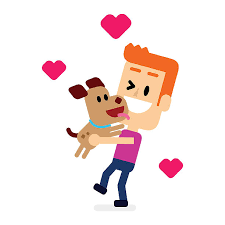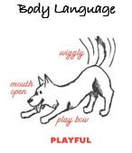Needy Behavior in Pets: Why It Could Be a Sign of a Physical Ailment
www.vetnaperville.com
(very nice site with Health Library)
www.vetnaperville.com
(very nice site with Health Library)

One of the reasons we enjoy pet ownership is because it gives us the opportunity to experience the love and companionship of a devoted, loyal friend who depends on us for their every need. But just because we love our pets dearly as members of our family does not mean that we necessarily want them to follow us around everywhere, constantly begging for attention in one way or another. Obviously, those pets that suffer from severe separation anxiety and noisily bemoan our absence can be a real problem, but even the “silent stalker” who follows you carefully from room to room, never letting you out of their sight, can become exhausting to handle. Your needy pet may actually be trying to tell you something–and it may not be that they have anxiety issues.
Physical Ailments and Needy Pets
You may dream of being able to hold a real conversation with your pet, but the fact is that you just don’t speak the same language and may therefore never truly understand what they are trying to say to you. However, your pet will still try to communicate to you in a variety of ways, and if you are successful at deciphering the clues you can figure out what they need or want. This is what is occurring when you have a needy pet–they are trying in whatever way they can to let you know that something is wrong, and they want some help.
Whether your pet whines, cries out, destroys furniture or simply follows you around constantly, they are suffering from some degree of separation anxiety that either originates from physical or mental causes, and it’s your job to help sort out which it is. The bottom line is that a pet who is truly happy and healthy in every way is generally calm and relaxed, and not needy at all. They may follow you around to some degree, perhaps because they are hungry or desire affection, but they won’t remain glued to your side at all times. This type of constant anxiety is unhealthy for them and if it comes on suddenly it usually does indicate the presence of a physical issue.
Pets tend to demonstrate physical ailments through physical symptoms since they cannot tell you what hurts or how. Any change in your pet’s normal patterns of behavior is, therefore, reason enough to take them to the veterinarian for a full examination. It is possible that you will have aided them in getting diagnosed and treated for anything from a minor health issue, like a stomach upset, to a major health issue, like diabetes. It is also possible that nothing at all may be wrong with them, in which case you can work on resolving their anxiety issues through positive reinforcement training.
Positive reinforcement training works by rewarding pets for displaying desirable behaviors. You can encourage your pet to be comfortable alone by providing them with an activity or toy that occupies their attention, even while you are still in the room (this way they don’t associate that activity or toy with your absence, but just with a pleasant experience). When they calmly accept this alone time, they should be rewarded with gentle praise or a pat on the head.
It is also important to consider the fact that there is a definite difference between fear and respect, and unfortunately, needy behavior can sometimes fall into the former category. They may be fearful due to some unpredictable event or some past, unpleasant experience, but there is also the chance that fear stems from physical ailments as well. Fortunately, it is easy to learn how to prevent fear and even how to resolve it compassionately. And always remember that a calm pet is a happier, healthier pet.
|
Many of my clients have heard their dog coughing or sneezing, and this prompts a very natural question. Do dogs get colds?
|
Compulsive tail chasing, or 'spinning' as it is commonly known in Bull Terriers, is a canine compulsive disorder that is seen most often in Bull Terriers, and to a lesser extent, in German Shepherd Dogs.
|
Most owners care for their dogs and they care about how they are feeling. They want to know whether their dogs are contented, or if they are upset. It adds warmth to the soul to empathize with another individual and especially so with another species.
|





